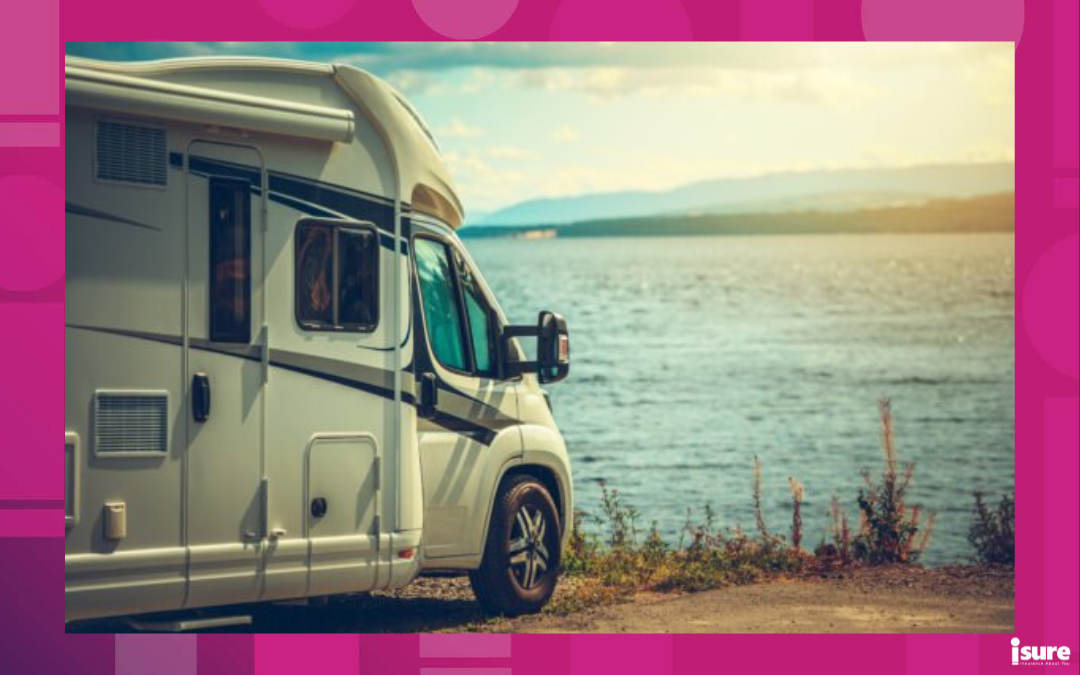With travel restrictions still in place, many Canadians are looking to their own backyards for their next vacation. Exploring Ontario is a great way to decompress while exploring some beautiful scenery. Vacations that include RVs or travel trailers are gaining in popularity in this time of social distancing. Still, it’s important to plan for worst-case scenarios, which means travel trailer insurance is an important part of your trip planning. Here’s our breakdown of travel trailer insurance, and a brief rundown of optional coverages to keep you protected.
What is a travel trailer?
A travel trailer is towed by your vehicle or a camper that is transported on the bed of your truck. By definition, a travel trailer is an RV that is not motorized. For this reason, it is not legally required to have its own auto insurance policy i.e. you are not obligated to insure your travel trailer.
Three categories of RV insurance coverage
- RV’s & Motorhomes – There are three classes: A, B, and C. They are the motorized recreational vehicles that can be driven to your intended destinations.
- Trailers – These are non-motorized and include fifth wheels, travel trailers, truck campers and tent trailers.
- Park Trailer Models – These are only on the road during the initial move to the RV park or other rented pad location, and are used only as a recreational home.
What does Ontario RV insurance cover?
Travel trailer insurance is similar to automobile insurance, but is more comprehensive and specialized to protect the following vehicles:
- Fifth-wheels
- Pop-up campers
- Stationary travel trailers
- Park model travel trailers
- Truck-mounted campers
- Hybrid travel trailers
Travel trailers and your auto policy
When it’s attached to your vehicle, a trailer can have some coverage under your standard auto policy. As for how coverage applies, this can vary by province. It’s best to check your provincial policy wordings and your auto policy to see what limits or exclusions exist.
As a summary, here’s how your auto policy could cover a trailer:
- In Ontario – When any trailer (whether you own it or not) is hooked up to your car, your auto policy treats the trailer and your car as a single vehicle. This applies when it comes to liability, accident benefits and uninsured automobile coverages. In other words, when attached, a trailer is covered for these three coverages.
- Direct compensation – Property damage coverage (which covers your car when you’re in a not at-fault accident) will only extend to a trailer that is owned by you. This trailer is not designed to be lived in, for carrying passengers or commercial purposes.
- If damage to the trailer occurs while attached to a personal car that has liability coverage, you’ll be covered.
It is important to note that your auto policy does not come with physical damage coverage for an owned trailer. If you’re at-fault for an accident that causes damage to your trailer or if the trailer is stolen or vandalized, you’ll need to pay for it out of pocket. In order to secure physical damage coverage (collision or comprehensive coverage) for a trailer that you own, you will need to buy additional insurance.
Just keep in mind, you will likely need to also insure your towing vehicle with the same insurance provider as your trailer.
Trailer coverage under your auto policy
If your trailer is being towed on your vehicle, then third-party liability coverage of your auto policy is in force. Your travel trailer is not covered by your car insurance when it is parked. Always make sure you have taken the time to ensure that it is attached properly to the towing vehicle, meaning it’s deemed road-worthy, and all indicator lights and break lights are fully functional.
Important: Your trailer won’t be covered by a normal car insurance policy once it’s unhooked form your vehicle. You may want to speak to your isure representative to discuss how your car insurance works with trailer insurance. In some instances, your trailer can be covered through comprehensive insurance coverage for your vehicle.
Liability coverage
If your trailer is not being towed, it is important to remember that is not covered by your auto insurance policy while it is parked. So, if someone is injured in or around your trailer and files a claim, your auto policy would not cover you. Third-party liability insurance covers legal expenses associated with a liability claim, compensation for medical bills and lost income for the injured person or damage to another person’s property. These types of expenses can quickly escalate; therefore you should have liability insurance through your travel trailer insurance policy.
Do I need a separate policy for my trailer?
Your contents insurance coverage, which is part of your home policy, might cover the trailer as part of your property while on your home’s premises—but trailers are expensive, and contents coverage can be depleted during a claim. For high-value trailers, most insurance companies recommend purchasing a separate RV and trailer insurance policy to make sure you have maximum protection on your investment. Your isure broker can help with this!
Additional coverage for your travel trailer
One of the most important reasons to have travel trailer insurance is protecting your trailer from physical damage. You can purchase collision and comprehensive coverage for the following scenarios:
- Collision coverage helps you pay for repairing or replacing your trailer if it is damaged in a collision. This includes collisions with other vehicles, the ground, and objects, like guard rails.
- Comprehensive coverage protects your travel trailer from unexpected risks not associated with a collision. Examples include vandalism, theft, weather, water damage, windshield damage, fire, falling objects and lightning.
- You can also purchase all-perils coverage, which is a combination of comprehensive and collision insurance, or specified perils coverage. This protects your trailer from risks listed in your policy.
How much does travel trailer insurance cost in Ontario?
On average, your travel trailer insurance can cost anywhere from $18 to over $1,000 per month. To illustrate a few examples, premiums for a travel trailer valued at $30,000 would cost an estimated $46 per month. However, a travel trailer valued at $100,000 would cost an estimated $161 per month.
Do I need my own insurance policy for my travel trailer?
No, you are not required to carry insurance coverage on your travel trailer. A travel trailer is not the same as an RV, so it does not fall under the same insurance needs. When towing your travel trailer, the liability extends from the towing vehicles’ auto policy. However, once the vehicle is parked, you will not receive the coverage extending from the automobile. This is why we always recommend carrying a separate liability insurance policy for your travel trailer.
Is my travel trailer road legal without an insurance policy on it?
Your travel trailer is considered road legal so long as it is being towed by an insured and registered vehicle. You can also carry a specialty travel trailer insurance policy to ensure you will receive coverage on the trailer no matter what it is being used for.
What kind of coverage does travel trailer insurance include?
Your travel trailer insurance includes coverage for the physical structure of your trailer against damages from vandalism, fire, collision and more. It also protects your contents and your personal liability if you are responsible for bodily injury or property damage to any third party.
Is there mandatory protection needed for RVs?
Similar to the mandatory protection you would get with your auto insurance, the mandatory protection you should get with your RV/travel trailer are: third-party liability, direct compensation, accident benefits, and uninsured and unidentified automobile insurance coverage.
Is the stuff in my trailer covered?
Like personal belongings in your car, contents in your trailer are not covered under your auto policy if they are damaged or stolen. However, depending on the circumstances and the value of the loss, you may have coverage for these stolen or damaged items under your home policy.
Does a trailer need a safety certificate in Ontario?
In the past, the “Yellow Annual Safety Inspection Sticker” applied to vehicles used for either commercial or personal functions. However, effective July 1, 2019, the Ontario’s Regulatory Registry amended the Act. This means that vehicles towing for personal use are now exempt from the requirement for an annual inspection.
Protect yourself and your trailer when you travel
Travel trailer insurance has many benefits that you will be grateful you have should you experience an emergency while on vacation. Customizing a plan that will protect you from risks is what we do. Talk to an isure representative about travel trailer coverages available to protect you and your loved ones on your next getaway.




